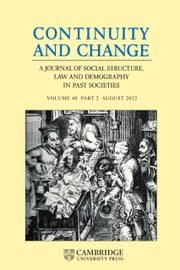Crossref Citations
This article has been cited by the following publications. This list is generated based on data provided by
Crossref.
Brunnbauer, Ulf
2009.
Gender Politics and Everyday Life in State Socialist Eastern and Central Europe.
p.
77.
Klüsener, Sebastian
Perelli-Harris, Brienna
and
Sánchez Gassen, Nora
2013.
Spatial Aspects of the Rise of Nonmarital Fertility Across Europe Since 1960: The Role of States and Regions in Shaping Patterns of Change.
European Journal of Population / Revue européenne de Démographie,
Vol. 29,
Issue. 2,
p.
137.
Sternadori, Miglena
2013.
Heroines Under Control: Unexpected Portrayals of Women in the Organ of the Bulgarian Communist Party, 1944–1989.
Women's Studies in Communication,
Vol. 36,
Issue. 2,
p.
142.
Klüsener, Sebastian
2015.
Spatial variation in non-marital fertility across Europe in the twentieth and twenty-first centuries: recent trends, persistence of the past, and potential future pathways.
The History of the Family,
Vol. 20,
Issue. 4,
p.
593.
Román Antequera, Alejandro
2015.
L’effet de la nécessité : l’installation des bases militaires états-uniennes en Espagne, un facteur de changement.
Annales de démographie historique,
Vol. n° 128,
Issue. 2,
p.
85.
Van Boeschoten, Riki
2015.
Migration in the Southern Balkans.
p.
161.
Nikolova, Miroslava
and
Ghodsee, Kristen
2015.
Socialist Wallpaper: The Culture of Everyday Life and the Committee of the Bulgarian Women's Movement, 1968–1990.
Social Politics: International Studies in Gender, State & Society,
Vol. 22,
Issue. 3,
p.
319.
Ironside, Kristy
2017.
Between Fiscal, Ideological, and Social Dilemmas: The Soviet ‘Bachelor Tax’ and Post-war Tax Reform, 1941–1962.
Europe-Asia Studies,
Vol. 69,
Issue. 6,
p.
855.
Yotova, Maria
2018.
The “goodness” of homemade yogurt: self-provisioning as sustainable food practices in post-socialist Bulgaria.
Local Environment,
Vol. 23,
Issue. 11,
p.
1063.
Jarska, Natalia
2021.
‘We treat each other as equal partners’ the understanding of companionate marriage in postwar Poland.
The History of the Family,
Vol. 26,
Issue. 4,
p.
638.
Brainerd, Elizabeth
and
Malkova, Olga
2021.
Do Family Policies Affect Births, Maternal Employment and Marital Stability?.
SSRN Electronic Journal,
Vatan, Meltem
2021.
Transcultural Diplomacy and International Law in Heritage Conservation.
p.
273.
Tocheva, Detelina
2023.
Religions et classes sociales.
p.
161.
Melegh, Attila
2023.
The Migration Turn and Eastern Europe.
p.
27.
Brainerd, Elizabeth
and
Malkova, Olga
2023.
Maternity benefits and marital stability after birth: evidence from the Soviet Baltic republics.
Journal of Population Economics,
Vol. 36,
Issue. 4,
p.
2309.




